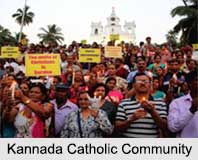 Kannada Catholic Community is largely settled in Karnataka. Soon after the capture of Goa in 1510, the Portuguese established factories at Honore, Barcelore and Mangalore in pursuance of their treaties with the chiefs of Sonda, the kings of Vijayanagar and the local chiefs. In a short period Christian (Catholic) settlements sprang up in these towns and several other places in the interior of Kannada.
Kannada Catholic Community is largely settled in Karnataka. Soon after the capture of Goa in 1510, the Portuguese established factories at Honore, Barcelore and Mangalore in pursuance of their treaties with the chiefs of Sonda, the kings of Vijayanagar and the local chiefs. In a short period Christian (Catholic) settlements sprang up in these towns and several other places in the interior of Kannada.
The record of Kannada Catholics in the freedom movement is creditable. Those who did not participate directly in the struggle helped the cause by sheltering the fighters and giving them moral and material support. Catholics have played a leading role over several decades at the village panchayat level and in the Mangalore municipality.
History of Kannada Catholic Community
To prevent the newly-converted Catholics from practising Hindu customs, the Portuguese introduced the Inquisition in Goa in 1560. Rather than been declared heretics and be condemned to death, they left Goa to settle down outside the Portuguese dominion. Large numbers went to Kannada where they were welcomed by the Bendore kings of Kannada (1565-1760), given grants of land and recruited to their regiments. There they formed a large and important community as is clear from the clauses guaranteeing their interests incorporated in the treaties concluded between the Portuguese and the Bendore Kings in 1671, 1678, 1707 and 1714.
In the last quarter of the 18th century Tipu Sultan of Mysore, suspecting that the Catholics were supporting the British against him, placed almost the entire population (about sixty to eighty thousand) in captivity at Seringapatnam till 1792, when those who had survived went back to Kannada where they had to start afresh as their property had been appropriated by others.
Society of Kannada Catholic Community
Caste system prevails in the Kannada Catholic Community. This system is somewhat similar to that of the Hindus. Besides, the people of the Kannada Catholic community are quite industrious too.
Profession of Kannada Catholic Community
The Christians who left Goa were for the most part skilled agriculturists who abandoned their irrigated fields in Goa to achieve freedom. The remainder were skilled carpenters, goldsmiths, artisans and merchants.




















